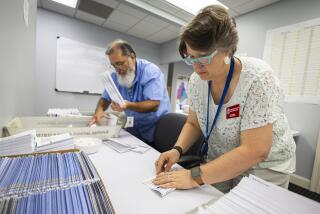An Immigrant President? It Could Happen
WASHINGTON — Since the founding of the United States, the office of president has carried a qualification not required for any other elected federal post. Under the Constitution, only a “natural born citizen” can be president.
Now, as Austrian-born Arnold Schwarzenegger chases the governorship of the most populous state, the House and Senate are weighing proposals for a constitutional amendment that would allow a naturalized citizen to become president. But Schwarzenegger’s candidacy is only a side issue in the debate.
The question turns on whether a decision by the framers of the Constitution more than 200 years ago remains relevant in today’s more inclusive America, one in which the foreign-born population is at an all-time high.
Conservatives such as Senate Judiciary Committee Chairman Orrin G. Hatch (R-Utah) and liberals such as Rep. Barney Frank (D-Mass.) favor opening the presidency to immigrants. Hatch’s bill would allow people who have been citizens at least 20 years to hold the office, while Frank is supporting a House bill with a 35-year citizenship requirement.
“I think it’s a mistake to have that in the Constitution,” Frank said of the current limitation. “It’s reflective of a double standard that somehow immigrants aren’t fully equal with people born here.”
The amendment would have to be approved by a two-thirds vote in both chambers of Congress and ratified by three-fourths of the state legislatures.
Chances are slim that either version would pass in the near future, but a native-born constituency of supporters is emerging from the families of thousands of youngsters adopted from overseas into American families.
First-grader Jonah Yinger of Syracuse, N.Y., who was born in Vietnam and adopted by his parents when he was an infant, is among those children.
Jonah’s father, John Yinger, launched a campaign in 1998 to amend the Constitution, complete with an Internet Web page.
“Jonah has lived in the United States nearly all his life,” said Yinger, a Syracuse University economist. “But he is going to be treated differently than all other citizens. When he gets to a class on the Constitution, he is constantly going to have to hear that he can’t run for president, while every other kid can.”
Children were also on the mind of Rep. Vic Snyder (D-Ark.) when he introduced the House amendment earlier this year. Snyder said he was thinking of his niece Sara Doty, a teenager living in Oregon. Sara was born in South Korea and adopted at age 10 months by Snyder’s sister.
“It’s un-American not to let kids adopted at a young age have the opportunity to run for president,” he said. “These kids have no recollection of where they were born. They are raised as Americans, and it’s just a stretch to me to say that they could have divided loyalties.”
The rights of children adopted from overseas did not figure in the deliberations of the Constitutional Convention in 1787. But the fear of foreign monarchs was certainly in the air.
Historian Forrest McDonald, a professor at the University of Alabama, said the framers were very familiar with the example of 18th century Poland, where foreign powers had subverted the election of a monarch and installed their own puppet, allowing them to carve up the country. In America, rumors swirled that the Constitutional Convention intended to invite a relative of English King George III to reign over the just-liberated colonies.
Against this background, and without dissent or discussion, the Constitutional Convention adopted language stating that “No Person except a natural born Citizen, or a Citizen of the United States, at the time of the Adoption of this Constitution, shall be eligible to the Office of President; neither shall any Person be eligible to that Office who shall not have attained to the Age of thirty five Years, and been fourteen Years a Resident within the United States.”
The citizenship requirement remains just as valid in the age of globalization, McDonald said, and should not be changed.
“I don’t think you ever just get over the place where you were born,” McDonald said. “If you’re a refugee and you’re getting out of some horrible place, maybe. But if you’re just coming here from another country, it’s always likely that you’re going to be hyphenated in your own mind.”
Even if a foreign-born president judged fairly in a dispute between the United States and a home country, that president might still have to contend with a public perception of bias, McDonald said. He raised the specter of a foreign government planting an agent in the United States with the intention of grooming the operative for commander in chief of the world’s sole remaining superpower.
“People who think in very long-range terms have lots of patience,” McDonald said.
Supporters of the amendment dismiss such fears.
“The history of the United States is replete with scores of great and patriotic Americans whose dedication to this country is beyond reproach, but who happen to have been born outside of her borders,” Hatch said in introducing his amendment July 10. He noted former secretaries of State such as Henry A. Kissinger and Madeleine Albright and Michigan Gov. Jennifer Granholm, a Democrat.
Other restrictions on political participation and holding public office have been discarded in the last 200 years, including barriers against women and African Americans, say supporters of the amendment.
“This restriction has become an anachronism that is decidedly un-American,” Hatch said.
In California, Schwarzenegger recently celebrated the 20th anniversary of his American citizenship. That would make him eligible to run for president if the Hatch amendment passed. Under the House version, Schwarzenegger would have to wait an additional 15 years, putting him over age 70.
When asked by CNN’s Larry King if he favored changing the Constitution to allow naturalized citizens like himself to run for president, Schwarzenegger answered, “I don’t have those intentions, to be honest with you.” Changing the Constitution “is something to think about, but I haven’t really thought about it,” he added. “That is not what I am concentrating on. You know, that’s something they can debate in Washington.”
Times staff writer Doug Smith in Los Angeles contributed to this report.
More to Read
Get the L.A. Times Politics newsletter
Deeply reported insights into legislation, politics and policy from Sacramento, Washington and beyond. In your inbox three times per week.
You may occasionally receive promotional content from the Los Angeles Times.










